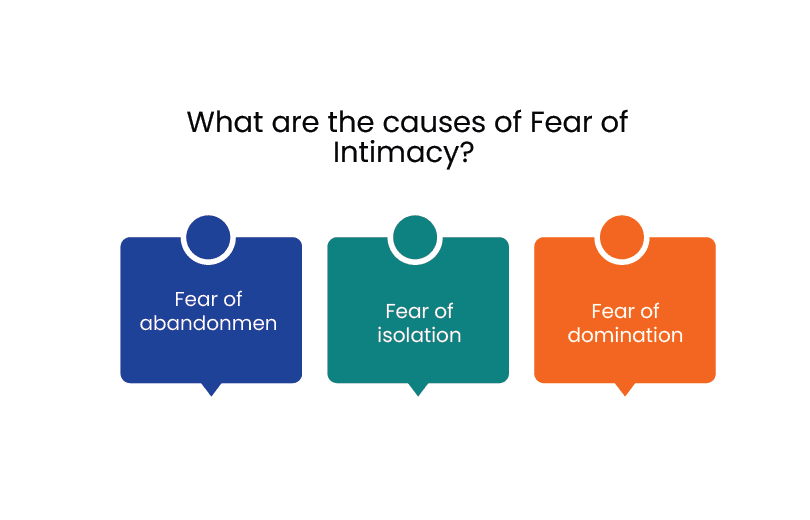Intimacy refers to the act of connecting with a person and sharing your true self closely. It is the ability to share your innermost thoughts, ideas and feelings with an individual. At times, you may struggle to build relationships or have a constant urge to run away from a relationship, which happens when you are afraid of intimacy. Fear of intimacy is a phobia caused by anxiety.
What is the Fear of Intimacy?
Fear of Intimacy [1] is a mental disorder that usually occurs due to the anxiety of an individual to form a close relationship with another person. It is a social phobia that may stem from dysfunctional bonding experiences either in childhood or relationship failures in adulthood. The intimacy can be of the following types:
- Emotional Intimacy: It is the closeness in which both partners feel secure and loved. Emotional Intimacy connects both the partners’ souls. They understand each other very well.
- Spiritual Intimacy: The partners develop a spiritual connection. They share and open their hearts to God. They create solid emotional bonding.
- Experiential Intimacy: The partners develop such bonding by spending quality time discussing their common interests and activities.
- Intellectual Intimacy: Intellectual intimacy arises by sharing hopes, wishes, dreams, fears and experiences with your partner.
Read more about: Importance of trust in a romantic relationship
What are the symptoms of Fear of Intimacy?
Intimacy is the desire to build emotional or physical ties with an individual. If you fear intimacy, you wish to create a distance from a person. You may not seem to allow yourself the vulnerability. Intimacy avoidance may occur if a person has [2]:
- Trust issues
- Low self-esteem
- Anger issues
- Inflatable sexual desire
- Deliberately avoid physical contact
- Self-isolation
- History of unstable relationships
- Reluctance to share feelings or express emotions
What are the causes of Fear of Intimacy?
In general, the fear of intimacy may occur because of some bad experiences in the past, primarily rooted in childhood. There may be multiple reasons in adult relationships that stop a person from developing intimate relations emotionally, physically or sexually. The possible factors for the anxiety and fear of intimacy include:
- Fear of abandonment: Such fear usually occurs due to being abandoned by a person. The victim is worried that if they engage in a relationship, the other person will leave him in the future. Fear of abandonment happens due to any incidents in the past or separation or death of parents or relatives.
- Fear of isolation: You may avoid making intimate relationships due to a fear of rejection. You never initiate or get close to an individual due to the fear that they may isolate you, which mainly happens if you have seen another person experiencing the same and would not like to get hurt.
- Fear of domination: The person who fears dominating by a partner may refrain from getting closer in relationships as they think the other person will control them. These people might have been victims of bullying or ragging in the past.
Must Read: Healthy relationship: Love in the time of screens
What is the fear of intimacy tests?
The fear of intimacy test [3] is a self-evaluation that determines the fear of intimacy. This test can decide the story even if a person is not in a relationship. A high score implies that you are terrified of building intimate relations.
According to surveys, depressed women face higher levels of intimacy fear. As a result, the longevity of their dating relationship or married life is also high. Also, the women who have faced physical abuse in the past or rape survivors experience less intimacy with their partners. Childhood sexual abuse victims are often afraid to make intimate relations. Their fear of intimacy test scores is extremely high as they are scared of forming any close relationships, thinking that it might prove harmful for them. Child molesters also show higher levels of intimacy fear than rapists.
Must Read: 5 Most Common Relationship Problems Faced By Couples
Why do you need to take The fear of intimacy test?
The fear of intimacy test is essential to assess the condition of a person when fear of commitment is one of the significant reasons for breakups in relationships. This test helps to diagnose and understand a person’s mindset and the underlying reasons for their fear of forming close relationships.
What does the Test for intimacy fear consisting?
The 35-item Fear of Intimacy Scale for intimacy fear test consists of fundamental components to evaluate intimacy in a relationship. The person is required to answer 35 questions in the trial. The test returns a score between 35 and 175 to deduce whether a person is experiencing fears of intimacy. The test aims to study the possible outcomes produced by an intimate relationship. A high score implies a high level of anxiety.
Result and analysis of the Fear Of Intimacy Test
Conquering the fear of intimacy can be difficult. However, analysing the fear and undergoing treatment to eliminate it is essential. Therapy or my efforts treat this To achieve favourable results, one should be willing to face uncertainty and put in efforts to review your life and bring in the desired changes.
Know more about: Erotophobia – The Fear Of Intimacy and Its Causes
How do overcome Fear Of Intimacy?
To get over the fear of intimacy, one should analyse [4] the events in life and decide from where the suspicion arose. One should do the following:
- Realize your value: Belief in yourself. Not all relations are not lasting forever. If some intimate relationships end unexpectedly, do not hold yourself responsible for it. Learn to forget and move on in life.
- Discuss with your partner: Communicate with your partner and let him know what’s going on in your mind. Mention your boundaries and explain what makes you feel safe. Tell him if you want to seek help from a medical professional.
- Seek medical advice: Fear of intimacy is an anxiety disorder. The ultimate treatment for this mental disorder is psychotherapy. The therapy consists of medical professionals who help you find out the origin of fear and how to cope with it.
Talk to Our Experts
Conclusion
Fear of intimacy occurs when a person fears to share a close emotional or physical bond with another person. It is most common in people with experiences of sexual and emotional abuse. Therefore people can contact the online mental health portal, United We Care. Because we have a pool of professionals to help people with mental health illnesses. However, therapies by medical professionals can help one overcome this disorder over time.
References:
[1] A. L. Vangelisti and G. Beck, “Intimacy and fear of intimacy,” in Low-Cost Approaches to Promote Physical and Mental Health, New York, NY: Springer New York, 2007, pp. 395–414.
[2] A. Pietrangelo, “Fear of Intimacy Overview: Causes, Symptoms, and Treatments,” Healthline, 10-Jan-2019. [Online]. Available: https://www.healthline.com/health/fear-of-intimacy. [Accessed: 02-Aug-2022].
[3] “Relationship Test – Intimacy,” NY MFT. [Online]. Available: https://www.nymft.com/relationship-test—intimacy. [Accessed: 02-Aug-2022].
[4] I. Ali, “Personality traits, individual innovativeness and satisfaction with life,” J. innov. knowl., vol. 4, no. 1, pp. 38–46, 2019.












